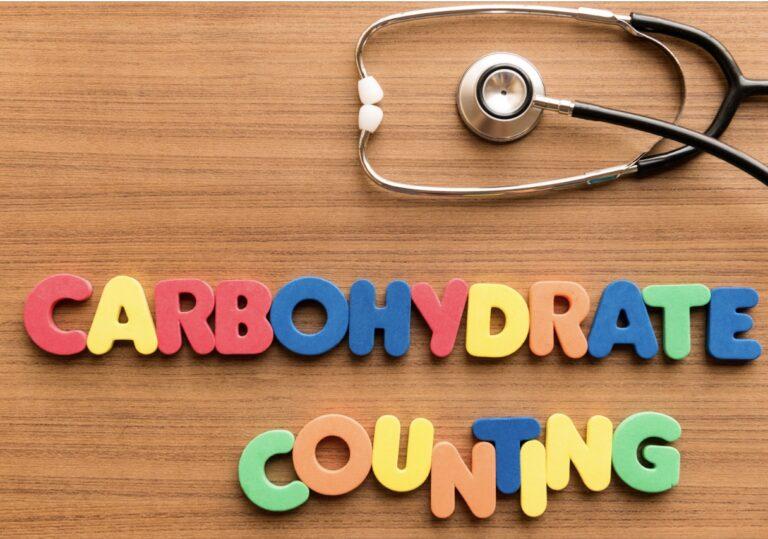We’ve heard so many times from people we’ve interviewed in our research programme that they would like to reduce the time spent and effort involved in counting carbs. The NowPatient app has a new feature for recording meals and snacks which we think can help.
Here’s a quick introduction and run-through of the thinking behind personal portion sizes and carb ranges. Before we do that let’s take a look at what carbs are and why monitoring carb intake is a useful dietary tool that can be used to help manage type 1 diabetes and type 2 diabetes.
What are carbs?
Carbohydrates include sugars, starches and even fibre. When it comes to carbs, there are three main types: simple carbs, complex carbs and dietary fibre. Simple carbs are made up of one or two sugar molecules and are found in foods like candy, cake and fruit juice. Complex carbs are made up of long chains of sugar molecules and are found in foods like bread, beans, and rice. Dietary fibre is a type of carbohydrate that the body cannot digest. It is found in foods like vegetables, fresh fruits, and whole grains.
All three types of carbs provide the body with energy. However, complex carbs and dietary fibre take longer to break down, so they provide a slow and steady source of energy and are viewed as healthy eating options. Simple carbs provide a quick burst of energy but can cause blood glucose levels to spike and then crash. That’s why it’s important to eat a mix of all three types of carbs to keep your energy levels stable throughout the day.
How do carbohydrates affect blood glucose levels in diabetics?
When we eat foods that contain carbohydrates, our body breaks down the carbs into glucose, which is then released into the bloodstream. In people without diabetes, this spike in blood sugar is quickly regulated by the body’s insulin response. However, in diabetics, either your pancreas does not produce enough insulin (type 1 diabetes) or the pancreas cells are resistant to insulin (type 2 diabetes). As a result, diabetics must carefully monitor their carbohydrate intake to maintain healthy glucose control. Too many carbs can lead to a dangerous spike in blood sugar, while too few carbs can cause low blood sugar levels (hypoglycemia).
What is carb counting or carb estimating?
Carb counting is a way of managing your blood sugar levels by keeping track of the amount of carbohydrates you eat in a day. Carbohydrate counting has become a key part of diabetes management and diabetes education. While it may seem like a lot of work at first, carb counting can be a helpful tool if you have diabetes. The key to carb counting is to be consistent and accurate in your measurements. Here are some tips to get you started:
- Start by tracking the carbohydrates in the foods you typically eat in a day. Use an online tracker a feature the Quin app contains to record what you eat and drink throughout the day, as well as the carbohydrate content of each item
- Once you have a good idea of your daily carbohydrate intake, you can begin to make adjustments. If you find that you are eating more carbs than recommended, try substituting higher-carb foods for lower-carb options. For example, swap out white rice for cauliflower rice, or swap starchy vegetables like corn, white potatoes and sweet potatoes for non-starchy vegetables like broccoli, kale, cauliflower, peppers or mushrooms
- Learn how to read food labels. This will allow you to determine the grams of carbohydrates in each serving of food by looking at the nutritional facts label on the packaging
- Using measuring cups or a food scale help with portion control, which, in turn, helps you stick to your carb goals
- Meal planning can be key to success. By taking the time to plan, you can create delicious and nutritious meals that fit within your carb intake
- Remember that not all carbohydrates are created equal. Some types of carbs, like those found in whole grains, fruits, lentils, legumes and vegetables, are packed with nutrients and fibre that can help regulate blood sugar levels. On the other hand, processed carbs such as white bread and sugary snacks can cause blood sugar spikes. When carb counting, be sure to account for the type of carbohydrate as well as the quantity
It is important to speak with your doctor or registered dietitian or nutritionist before making any major changes to your diet. They can help you to put together a meal plan that keeps your food, medication and physical activity levels in mind. The healthcare professionals involved in your diabetes care can help you choose a carbohydrate goal and work out your insulin dose based on how many carbs you are eating.
Personal portion sizes
Everyone is different and this is a great thing. This is especially true when it comes to food. We all eat different meals in different-sized portions with different ingredients to suit our tastes.
We’ve found through our research that most people with diabetes have a usual serving size for frequently eaten meals. This is more common with breakfast and lunches than evening meals but still seems to hold true for the majority.
When not eating a usual portion, people may have a smaller portion of that meal or sometimes a larger portion but often not much more of a variation than that. It’s the way we instinctively see meals. Carbohydrate counting or carbohydrate estimation is an additional thought process layered on top of that.
So we’ve designed our portion size recording feature with this in mind. From now on, when you use the NowPatient app, you can record your meals as you see them – small, usual or large.
NowPatient and carbs
Carb ranges for different meals
Carb counting precisely is challenging. We live in a world of averages and estimates and trying to achieve precision in this world is incredibly difficult. For example, take two slices of toast. A slice of bread, once weighed, could be 12g of carbs according to the loaf packaging. This comes from lab experiments performed on many slices of bread and averaged, and maybe your slice of bread is baked very slightly differently. So it could be a little more at 13g of carbs.
For toast, it might be on average 1g of carbs more than a slice of bread because of the toasting. Your toast may be more or less burnt than the average piece of toast, so potentially 3g of carbs more than a slice of bread.
For two slices of toast, you could be eating between 26g (12g per slice of bread plus 1g from toasting and multiplied by 2) and 32g of carbs (13g per slice of bread plus 3g for toasting and multiplied by 2).
Carb ranges in the NowPatient app allow for this estimation range and also for any rounding for your carb ratios. If your carb ratio is 1 unit for 10g of carbs, then for 3 units of short-acting insulin you may round 25g of carbs up to 30g and 35g down to 30g.
So if your usual toast portion is 2 slices, then you may store 25g to 35g of carbs as your Usual portion in the NowPatient app. When you eat 1 slice, you may store 10g to 15g as your small portion and for 3 slices, 35g to 45g as your large portion. If you only ever eat 2 slices of toast, you never even need to enter the small or large portion ranges.
The next time you eat toast, you can come to NowPatient and all you need to think about is whether this is a small, usual or large portion for you. NowPatient will tell you your personal range of carbs you’ve previously recorded. No estimation or calculation is required.
Flexible and personal to you
We know this carb-counting approach won’t work for everyone. It’s impossible to build a solution that could cover every possible way people with diabetes view food but we’ve left some flexibility in there.
Food name entering is free form and long, so if you want to detail every ingredient of a meal in a single entry, you have the option. If you would like to define each ingredient and assign carbs to each, this is also possible. Carb ranges even allow you to specify the exact carb value by entering the same value in both gram inputs so you can be precise if you want to.
We hope you enjoy the latest version of the NowPatient app. If you’re unsure if this would work for you try it for a few days and see how it goes!
Medical Disclaimer
NowPatient has taken all reasonable steps to ensure that all material is factually accurate, complete, and current. However, the knowledge and experience of a qualified healthcare professional should always be sought after instead of using the information on this page. Before taking any drug, you should always speak to your doctor or another qualified healthcare provider.
The information provided here about medications is subject to change and is not meant to include all uses, precautions, warnings, directions, drug interactions, allergic reactions, or negative effects. The absence of warnings or other information for a particular medication does not imply that the medication or medication combination is appropriate for all patients or for all possible purposes.










